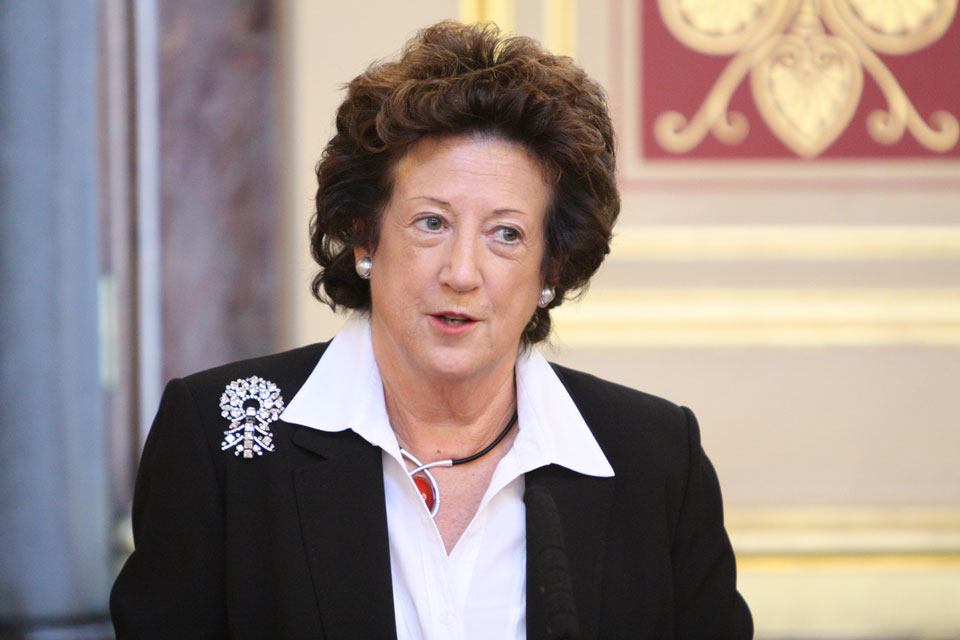Baroness Anelay opens conference on freedom of religion and belief
Speech delivered by Human Rights Minister Baroness Anelay to open conference held in the FCO's Locarno Suite

Good morning everyone. I want to join Rob in formally welcoming you, on behalf of the British Government, to the Foreign and Commonwealth Office. It is wonderful to see the room so full. I know many of you have traveled a long way, and I want to thank you for making that effort.
I am confident you will find your journey worthwhile, because the twin focus of our discussions is of such vital importance to us all: combating violent extremism and protecting the right to freedom of religion or belief.
On the face of it, these two things may not immediately appear to be related, but we believe they are often linked. Let me explain how.
Before I became involved in politics, I was a teacher. I saw how our experiences as children shape our view of the world, and the way we respond to others. Our attitudes are formed in the school playground. That is why, if children do not learn to respect differences in others, they may start to believe that it is acceptable to treat them differently.
What starts with childish name-calling in school can lead, later in life, to outright intolerance, where people are excluded from some jobs or discriminated against under the law.
If young people learn to treat people of other religions as outsiders, it can also mean that they easy prey for the hateful messages propagated by extremist organizations, such as Daesh.
Of course, this is not to say that everyone is radicalised in this way, or because of what they learn at school. However, I believe that if we tolerate a culture where people think that their fellow citizens are inferior because of their religion or belief, then we create fertile ground in which extremist ideologies can take root.
That is why freedom of religion is so important, and directly relevant to the fight against extremism. If we value others, regardless of what - if any - religion they follow, and if we teach our children to do the same, we also give them the tools to reject intolerance. If we lay the foundations for open, equal and plural societies, then we also build communities resilient to extremism; communities where everyone has the intellectual independence to resist hateful ideologies, religious or otherwise.
It is a challenging ambition, and one that requires the full commitment of governments. Here in the UK we face our own challenges, and that is why everyone in government, from Prime Minister down, is fully engaged.
Of course, in our networked world, no single country can tackle extremism alone. Foreign fighters and terrorists know no borders and many people are radicalised through the internet.
We need a global response to this global problem. We need to work together - as individual countries, and through institutions like the UN and the Commonwealth. We need all sectors of society to be involved – governments, civil society, faith leaders, academics and so on.
That is why today’s conference is so important. We’ve brought together inspiring speakers from across the world who will share very practical examples of how they are working to build a more open and equal society. We’ve asked them to focus on what they’ve actually done and to share practical ideas that you can think about replicating wherever you are working.
I know that freedom of religion or belief can be a sensitive issue. Particularly in our increasingly secular European society, we are naturally anxious to get it right. So at tomorrow afternoon’s regional workshops, we’ll have the opportunity to discuss how to adapt some of these ideas to different cultural contexts.
As well as suggesting imaginative ways to address the issues, the conference will also give you ideas about possible partners and mentors to help you put them into practice.
I want everyone to go away inspired, energised and full of ideas. As a contribution to this, I am delighted to announce that we have updated and reprinted our excellent Freedom of Religion or Belief Toolkit. You will have found a copy on your chair, and there are more next door. It is full of practical ideas for action. Please do take it and use it. And please let us know how it was helpful and any ways in which it can be improved.
In conclusion, I reiterate the message of our Foreign Secretary: that freedom and respect for human rights make societies more prosperous and stable.
Freedom of Religion or Belief is fundamental to a successful society. It builds resilience against the prejudice, discrimination and persecution that not only prevents a society from achieving its full economic potential but also leaves it vulnerable to extremism.
That is why it is so important that we work together now to put freedom of religion or belief at the heart of our effort to prevent violent extremism. I wish you a productive and successful day and look forward to discussing these issues further with you at this evening’s reception.